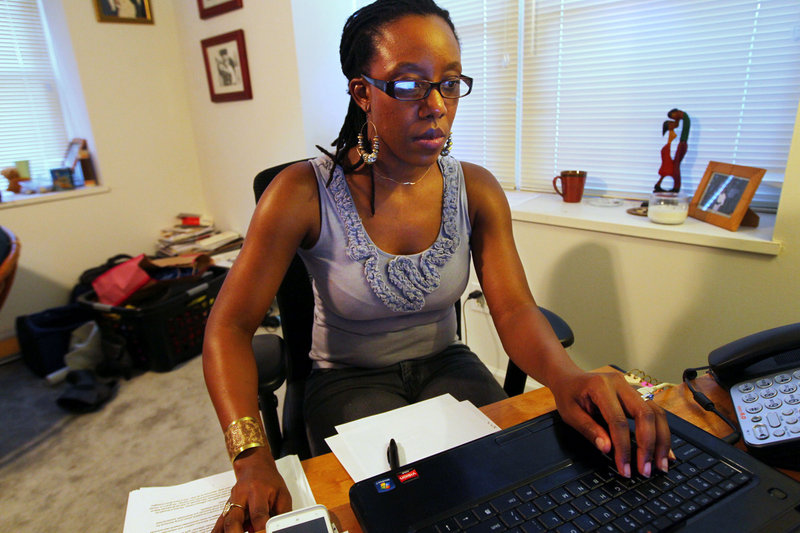ST. LOUIS — Every Tuesday morning, Teri Dobbins-Baxter starts her commute at 4 a.m.
She leaves home in the south suburbs of Chicago and goes to Midway Airport, where she hops a flight to St. Louis. Then she makes her way to St. Louis University, where she works as a law professor. She then spends two days teaching and meeting with students, and flies home Wednesday night.
The ranks of people like Dobbins-Baxter — who live in one metropolitan area but work in another – are growing fast. Technology continues to untether employees from their workplaces, while the weak job market and a lousy housing market has many families reluctant to relocate.
A study issued last month by New York University found that the jobs with this sort of arrangement climbed sharply in eight of 10 large metro areas from 2002 to 2009.
Some of these people work from home for companies in a different region. Some are traditional road warriors who travel all over. Some, like Dobbins-Baxter, have a regular commute – just one that spans states.
Regardless, said Mitchell Moss, the NYU professor who authored the study, the trend speaks to both the increased flexibility of modern-day workers – “the office” can be almost anyplace – and the challenges facing two-income families in a weak job market: Why uproot your family when your spouse can’t get a job in the new city?
“It tells you that there is an inter-regional economic relationship, which is growing between places like St. Louis and Chicago,” Moss said. “A region’s work force is not defined by its immediate suburbs.”
It also has implications for the people who live and work this way. Take Dara Taylor.
She works for a Boston-based health care policy nonprofit, from her apartment in St. Louis, where her boyfriend and family live. About a year and a half ago, she became the nonprofit’s first remote employee.
“Everything I do is by phone or email or by travel,” said Taylor, who has worked for the organization for two years. “Because that’s the case, I can work from another city.”
So Taylor spends a lot of time on Skype and conference calls with colleagues from the home office. She travels two or three times a month to other states and occasionally back to Boston. In some ways, this arrangement is more flexible, but Taylor said she finds it forces her to be more efficient.
“You’d think you can just roll out of bed and log in,” she said. “But it requires a great deal of discipline. I actually work more (here) than I did in the office. It probably has to do with making up for not being there in person.”
Then there are those for whom the road is the office. Jason Stokes lives in St. Louis but works in quality improvement for a Dallas-based company that makes pumps and seals for oil wells and power plants. He visits projects all over the world.
“Last year I spent 190 nights in hotel rooms,” he said by phone Monday from Los Angeles, where he’s wrapping up a three-week stint before heading to Virginia and then India.
All the travel’s not so glamorous, Stokes said, and it’s exhausting.
Dobbins-Baxter finds herself commuting for longer than she planned.
She was living in St. Louis three years ago; then she married a man from Chicago, with a career and large family there. The opportunities, she said, were better for her in Chicago than for him in St. Louis. So she moved up, they bought a house, and she began flying down to St. Louis University, with thoughts of finding a job in her new hometown.
Three years – and two small children – later, Dobbins-Baxter is still commuting, working long hours while she’s in St. Louis and splitting time between home and job when she’s in Chicago.
Her husband now works from home – which makes moving to St. Louis more of an option – but, she says, they’d probably lose money if they sold their house right now.
All these things – family, housing, the complexity of managing two careers in a weak job market – are big reasons this sort of two-city existence is growing. Moss said he expects that growth will continue.
It can be a grind – Taylor, Dobbins-Baxter and Stokes all said they don’t plan this kind of work life permanently. But at least for now, in this splintered economy and ever-connected world, it makes sense.
Copy the Story LinkSend questions/comments to the editors.



Success. Please wait for the page to reload. If the page does not reload within 5 seconds, please refresh the page.
Enter your email and password to access comments.
Hi, to comment on stories you must . This profile is in addition to your subscription and website login.
Already have a commenting profile? .
Invalid username/password.
Please check your email to confirm and complete your registration.
Only subscribers are eligible to post comments. Please subscribe or login first for digital access. Here’s why.
Use the form below to reset your password. When you've submitted your account email, we will send an email with a reset code.